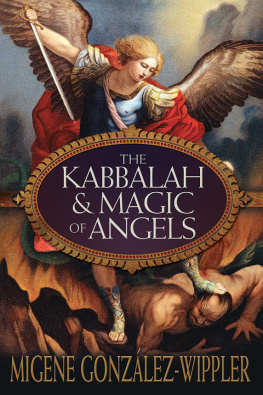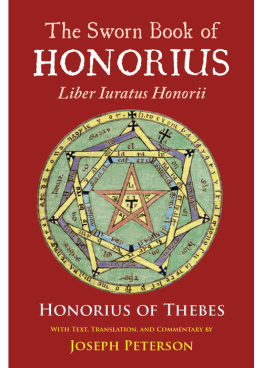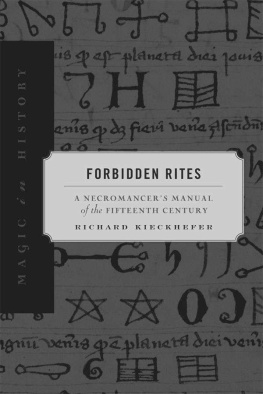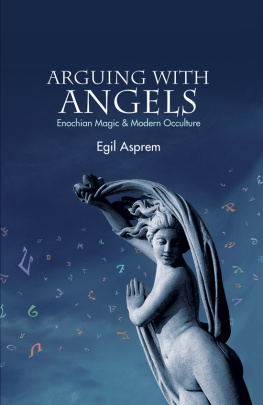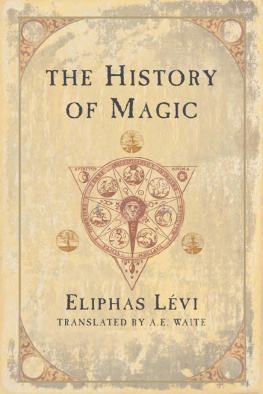As the title of this mysterious grimoire testifies, students were sworn to secrecy before being given access to this text, and only a few manuscripts survive. Nevertheless, The Sworn Book of Honorius is considered one of the most influential magic texts ever discovered. Bits of its teachings are alluded to in other texts: like the use of the magic whistle for summoning spirits. Another key element of its ritual, the elaborate Seal of God, has been found in texts and amulets throughout Europe.
Interest in The Sworn Book of Honorius has grown in recent years. It has been discussed at length in several recent books. Yet no modern translations have been attempted. A critical edition of the Latin text by Gsta Hedegrd (2002), has already become somewhat dated by new research.
Purporting to preserve the magic of Solomon in the face of intense persecution by religious authorities, this text includes one of the oldest, most detailed, and complete magic rituals. It is aggressively pro-magic, countering that persecution and anti-magic hysteria were themselves inspired by demons seeking to suppress the divine art.

Permission is hereby granted to make one handwritten copy for personal use, provided the master bind his executors by a strong oath (juramentum) to bury it with him in his grave.
Beyond this, whoever copies this sacred text without permission from the editor will be damned.
Published in 2016 by Ibis Press
A division of Nicolas-Hays, Inc.
P. O. Box 540206
Lake Worth, FL 33454-0206
www.ibispress.net
Distributed to the trade by
Red Wheel/Weiser, LLC
65 Parker St. Ste. 7
Newburyport, MA 01950
www.redwheelweiser.com
Copyright 2016 by Joseph H. Peterson
All rights reserved. No part of this publication may be reproduced or transmitted in any form or by any means, electronic or mechanical, including photocopying, recording, or by any information storage and retrieval system, without permission in writing from Nicolas-Hays, Inc. Reviewers may quote brief passages.
ISBN 978-0-89254-215-4
EBOOK ISBN 978-0-89254-630-5
Library of Congress Cataloging-in-Publication Data
Available upon request
Book design and production by STUDIO 31
www.studio31.com
Printed in the United States of America
[MV]
www.redwheelweiser.com
www.redwheelweiser.com/newsletter
TABLE OF CONTENTS
INTRODUCTION
E UROPEAN HISTORY IS PEPPERED with accounts of a mysterious book of magic called the Sworn Book of Honorius. It was so-called because its owners were sworn to secrecy by one of the most severe oaths ever recorded. They evidently took the oath quite seriously, for only a few manuscripts are known to survive, and only one is complete. Its actual contents have remained almost completely unknown, and no complete translation has been published until the present.
It is not surprising then that scholars and historians have only recently started to recognize its exceptional importance. In fact it is now recognized as one of the oldest and most important texts of Medieval magic. The text teaches a highly religious magic, or magic religion, but acutely at odds with the established church authorities. Religious historian Claire Fanger called it a key text, in the sense that it stands at a crossroads for many areas and disciplines.
Although little known today, this text must have been widely known in Medieval times and beyond. References to it appear in notices and legal proceedings throughout the period. Jean-Patrice Boudet provides details of the major references, which I will only list:
- (circa 1230) Possible mention by William of Auvergne condemning the text;
- (circa 1347) clear description in a trial record of Olivier Ppin from Mende France;
- (late 14th century) inventory of the library of the Augustinian friars of York;
- (1376) a reference in Eymerich's Directorium inquisitorum;
- (1389) possible mention by Mzires in his Dream of the Old Pilgrim;
- (1398) various condemnations by the Faculty of Theology of the University of Paris likely referred to the text;
- (1397) reference by John Gower in Confessio Amantis;
- (1400) Jean d'Astarac possessing a copy of Liber sacratus, which seems very likely that of Honorius;
- (circa 1494) the colophon in Italian magic manuscript Florence, Laurent., Plut. 89 sup. 38;
- (1518) Trithemius references the magic of Honorius of Thebes in Polygraphia;
- (1582) references in the secret writings of John Dee;
- (15831585) possible allusion by Giordano Bruno in his Cabala of Pegasus.
To this can be added
- (1623) a condemned sorcerer, Jean Michel Menuisier used a book titled Philippus Attinius onorius, likely Liber Iuratus Honorii to judge by the details of its contents.
In spite of its importance, these references reveal almost nothing of its actual contents. Better known than the text is the Sigil or Seal of God a central component of Honorius's magic. It was apparently part of a magical tradition that must have spread from the Mediterranean region across Europe. testifies to a long and elaborate transmission.
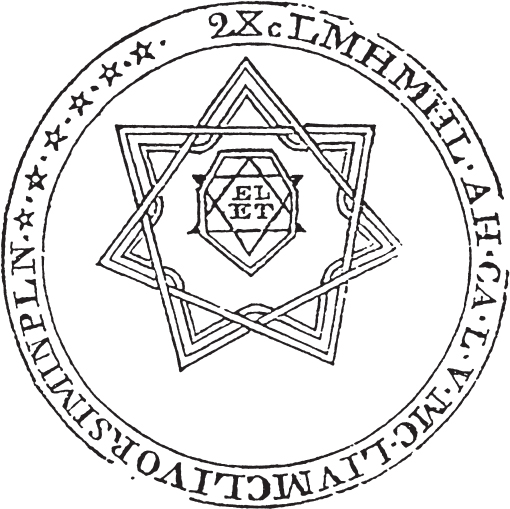
Seal of God from La Vritable Magie Noire (1750) p. 69.
The title Sworn book of Honorius came to be adopted in English literature based on the catalog entry for the 16th century English translation in London, brought to a wider audience's attention by influential occultist A. E. Waite (1898). Ironically, he himself didn't go into details on the contents of the text, only describing the prologue, which gives the text's own account of its origin. Waite was aware of two manuscripts, only one of which he identifiedSloane 313 in the British Library.
Butler mentions it only briefly in her 1949 Ritual Magic, apparently based solely on Waite's references. Shah also mentions it in his 1956 Oriental Magic, but again showed no knowledge of its actual contents, almost certainly having seen the references only in Waite's books.
Intrigued by these references, I took a summer in the Seventies to examine the manuscripts firsthand, and order microfilms for further study. It proved to be every bit as fascinating as hoped. The other purpose of my visit was to study the manuscripts and magic artifacts of Elizabethan polymath John Dee, and I was surprised to discover his connection to the Sworn Book (on which see below).
In 1977, Daniel Driscoll published a hybrid version of the text, based on the two manuscripts described by Waite. This was limited to only 450 signed and hand-numbered copies, beautifully printed in red, blue, and black ink. Although it was missing much of the text found in other manuscripts, it provided a fuller account of the contents than Waite and Thorndike, and has come to be a valuable collectible.
In spite of the taboo, the Sworn Book was one of the first texts I published on the Internet in 1998, on what was later to become
Since then, scholarly interest has exploded. Recent detailed studies have been published by Mathiesen, Kieckhefer, Klaassen, Boudet, Jan Veenstra, Mesler, and Chardonnens, as well as abundant references in literature. In particular, some of Ganell's Honorius material appears to be older than that of the better-known northern European manuscripts. For more on this topic, see below.
Title
Next page

